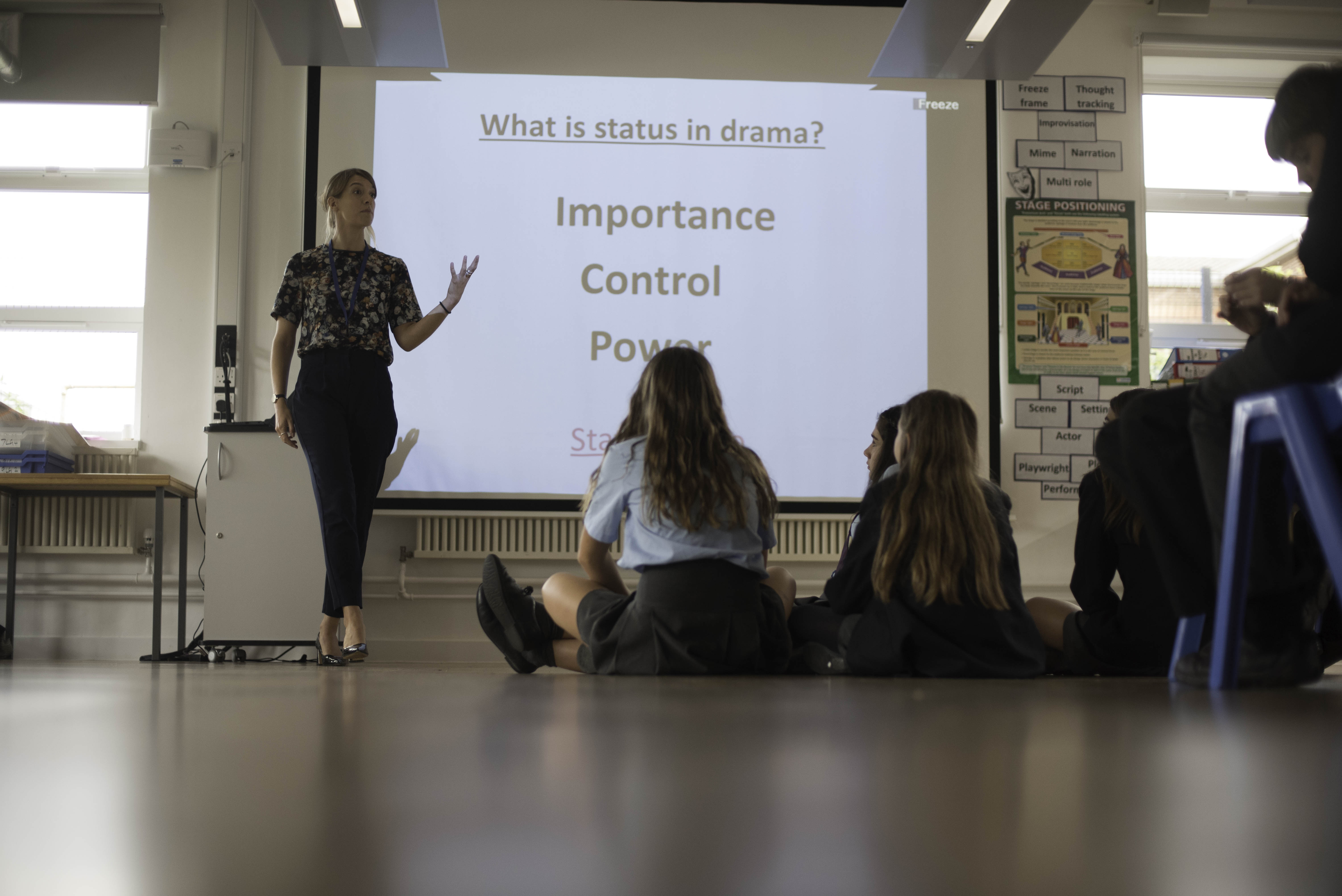Intent
Students should perform, experience and evaluate Drama across a range of historical periods, genres, styles and traditions, including the works of great playwrights and performers from across a range of cultures.
Students should:
- learn how to perform using their voices and movement skills, creating drama on their own and with others;
- learn how to collaborate and develop a piece of drama using technologies available to them;
- understand and explore how theatre is created and communicated combining the elements of performance skills and design;
- explore the role of the actor, director and designer;
- develop their critical and dramatic vocabulary so they can meaningfully evaluate their own work and others.
Implementation
Students will be taught to:
- Use their voice and movement skills to communicate a role
- Recognise a wide range of theatrical styles including but not limited to melodrama, Greek theatre, mime, physical theatre and apply them in performance
- Begin to Understand the importance of key practitioners
- Develop their drama vocabulary so they can confidently use subject specific terms to reflect on and evaluate their own work and others
- explore performance texts, understanding their social, cultural and historical context including the theatrical conventions of the period in which they were created
- work collaboratively to generate, develop and communicate ideas
- develop as creative, effective, independent and reflective students able to make informed choices in process and performance
- contribute as an individual to a theatrical performance
- develop an awareness and understanding of the roles and processes undertaken in contemporary professional theatre practice
- adopt safe working practices
Key concepts
- Creating
- Performing
- Responding
These cover the assessment objectives that are consistent across most exam boards for Key Stages 4 and 5:
|
AO1 |
Create and develop ideas to communicate meaning for theatrical performance. |
|
AO2 |
Apply theatrical skills to realise artistic intentions in live performance. |
|
AO3 |
Demonstrate knowledge and understanding of how drama and theatre is developed and performed. |
|
AO4 |
Analyse and evaluate their own work and the work of others. |
Links to Key Stage 2
Whilst Drama is not explicitly in the National Curriculum in primary school, it is a feature of the English curriculum, where it states: “All pupils should be enabled to participate in and gain knowledge, skills and understanding associated with the artistic practice of drama. Pupils should be able to adopt, create and sustain a range of roles, responding appropriately to others in role. They should have opportunities to improvise, devise and script drama for one another and a range of audiences, as well as to rehearse, refine, share and respond thoughtfully to drama and theatre performances.” There will be, nonetheless, differences in students’ Key Stage 2 Drama curriculum diet. However, from our experience, we know students at Key Stage 2 are generally encouraged to take on simple roles and perform to an audience (e.g. assemblies and shows – most notably at the end of Year 6).
The Key Stage 3 RET Drama curriculum extends these skills to encompass a knowledge and understanding of techniques, styles and the role of theatre through history. Students will have presented roles in class and been audience to external providers and/or their peers. Some may have taken part in school shows. Our aim is to develop a positive culture so that students can explore their talents and to foster a love for drama and theatre.
Relationship to the wider Key Stage 3 Curriculum
Drama is an embedded part of the English curriculum and there are extensive links. Difficult themes and topics explored in Drama will also be explored in PSHE, tutor time and assemblies. There are also links to dance in delivering performance, to art and DT in terms of the similarity of vocabulary and the creation of puppets/costume designs/set models, to ICT as students begin to use technology to provide music or projections and to music as it might be incorporated in a live or recorded capacity.
All of the skills practised at KS3 are embedded, developed and assessed in Key Stage 4. KS3 is a natural progression.
Extra-Curricular Experience
Drama is an inclusive subject and irrespective of their background students will be encouraged to take part in each school’s extra-curricular programme. Examples include:
BFS: Year 7 Pantomime, KS3 drama club, Playwriting club, GCSE showcase evenings, whole school production, theatre trips.
BKS: KS3 ‘Time To Shine,’ KS4/KS5 ‘Directors Company,’ showcase evenings, annual whole school production, external workshops with established drama companies and theatre trips to London and locally.
KSH: KS3 Drama Club, school production, workshops, theatre trips to London and locally, participation in Brighton Festival
THS: annual school production, National Theatre’s Connections project (KS4/5), Old Vic Schools Programme (KS4), theatre trips to the Westend and locally in south west London.
These demonstrate differentiation across the Trust dependent on student interest, ability and local cultural links.

